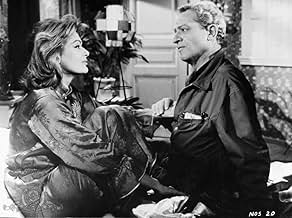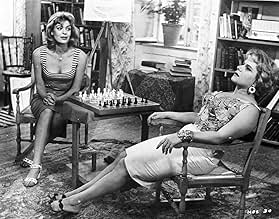IMDb-BEWERTUNG
7,3/10
6389
IHRE BEWERTUNG
Füge eine Handlung in deiner Sprache hinzuAn American scholar in Greece sets about improving the prostitute with whom he is infatuated.An American scholar in Greece sets about improving the prostitute with whom he is infatuated.An American scholar in Greece sets about improving the prostitute with whom he is infatuated.
- 1 Oscar gewonnen
- 3 Gewinne & 8 Nominierungen insgesamt
Giorgos Foundas
- Tonio
- (as Georges Foundas)
Dimitris Papamichael
- British Seaman
- (as Dimitri Papamichael)
Thanasis Vengos
- Thanasis
- (as Thanassis Veggos)
Empfohlene Bewertungen
Melina Mercouri takes an often-played role - the 'Whore with a Heart of Gold who Loves Life Despite It All' - and makes it her career-defining movie role, and she is the entire reason to watch the movie. Fiercely independent, sexually progressive, not spending her life trying to find the perfect man and gorgeous, she's a force of life.
Jules Dassin has directed a great movie but he should have hired an actor to play Homer, and not played it himself. He almost ruins all the charm the movie has going for it with his ineffective acting, bad line readings and stupid motivations. A better actor might have found a way around the rough spots but Dassin magnifies them.
Mercouri probably should have won Best Actress that year, but who can beat a Liz Taylor death scare? Plus Simeone Signoret had won Best Actress the year before, and Sophia Loren would win the following year..you don't want to upset icons like Louella Parsons, Frank Sinatra and John Wayne by giving ALL the Oscars to foreigners, do you?? Maybe the fact that she does not die at the end was too much..we all know the odds of longevity for a hooker in a Hollywood movie. Taylor met that criteria, as if she needed to help her own odds after almost dying of pneumonia.
Worth watching for sure. 8/10.
Jules Dassin has directed a great movie but he should have hired an actor to play Homer, and not played it himself. He almost ruins all the charm the movie has going for it with his ineffective acting, bad line readings and stupid motivations. A better actor might have found a way around the rough spots but Dassin magnifies them.
Mercouri probably should have won Best Actress that year, but who can beat a Liz Taylor death scare? Plus Simeone Signoret had won Best Actress the year before, and Sophia Loren would win the following year..you don't want to upset icons like Louella Parsons, Frank Sinatra and John Wayne by giving ALL the Oscars to foreigners, do you?? Maybe the fact that she does not die at the end was too much..we all know the odds of longevity for a hooker in a Hollywood movie. Taylor met that criteria, as if she needed to help her own odds after almost dying of pneumonia.
Worth watching for sure. 8/10.
Melina Mercouri, "The Last Greek Goddess", stars in the comedy "Never on Sunday"(1960) directed/written by Jules Dassin. She plays Illia, the most sensuous and radiant "lady of the night" in the seaport Pyres where every man adores her and she is the one who chooses her partners. Mercouri was 40 years old when she played Illia but she did not hide a single day of her age and she was gorgeous, full of the inner fire and absolutely irresistible. When the new Pygmalion, the intellectual American named Homer (of course) sails into the town and meets Illia, he decides that his search for meaning of life would end in Pyres if he would reform Illia and make her change her way of life. With all his intellect and education he couldn't understand a very simple truth about Illia - only true love might change her. Homer played by director/writer Jules Dassin is the weakest part of this mostly charming comedy. I agree with one of the IMDb commenters who said that "Jules Dassin has directed a great movie but he should have hired an actor to play Homer, and not played it himself... A better actor might have found a way around the rough spots but Dassin magnifies them." I guess that in real life Dassin was much more charming that in the film because he and Mercouri were married in 1966 and stayed married until her death in 1994.
7.5/10
7.5/10
SYNOPSIS: A well educated American tourists attempts to 'enlighten' a Greek prostitute in a small seaside village.
CONCEPT IN RELATION TO THE VIEWER Newer is not always better, and sometimes over analyzing a problem can only make it worse. Leave well enough alone. It is more important to be happy than to understand everything.
PROS AND CONS Every recent prostitute film from 'Irma la Duce' to 'Pretty Woman' owes a lot to this work. It was one of the first films that shed light on the idea that prostitution was a respectable and acceptable way to make a living.
If nothing else this film is a homage by Jules Dassin to his wife, Melina Mercouri. She is the focus of the film and she captivates any scene she is in with her zest for life and smoldering sexuality. The other thing you tend to fall in love with is the romantic ideal of living in Greece in 1960. It appears care free, relaxed and almost infectious with its love of the simple life.
The plot of the film is not overly complex and deals with an outsider, Homer (Dassin) arriving in town to study Greek culture. He is almost immediately captivated by Ilya (Mercouri) as one of the local prostitutes that 'freelances' and does not work for the town pimp. She negotiates a price with whomever she chooses, and sleeps with all the towns vendors in exchange for her daily goods (food, wine, drinks, etc), but she never 'works' on Sunday. Hence the title to the film.
Homer is smitten by Ilya and decides that he must 'save' her from what he perceives as a wretched life that is going no where and decides to educate her so that she can see the error of her ways. In the end, this does nothing but frustrate everyone in town. The education of Ilya does have a silver lining, which if anything, leaves the town more corrupted than when Homer found it.
The underlying theme of the film is that one should strive to be happy in what you do and more importantly, who you know. There is an interconnection between people in a small town, and disrupting those connections may lift some people up, but is not good for the whole of society. Regardless of his meddling, the towns people never turn on Homer, or blame him for anything. At their core, they know that life is to be enjoyed and blaming people for your troubles is just not part of the mix.
CONCEPT IN RELATION TO THE VIEWER Newer is not always better, and sometimes over analyzing a problem can only make it worse. Leave well enough alone. It is more important to be happy than to understand everything.
PROS AND CONS Every recent prostitute film from 'Irma la Duce' to 'Pretty Woman' owes a lot to this work. It was one of the first films that shed light on the idea that prostitution was a respectable and acceptable way to make a living.
If nothing else this film is a homage by Jules Dassin to his wife, Melina Mercouri. She is the focus of the film and she captivates any scene she is in with her zest for life and smoldering sexuality. The other thing you tend to fall in love with is the romantic ideal of living in Greece in 1960. It appears care free, relaxed and almost infectious with its love of the simple life.
The plot of the film is not overly complex and deals with an outsider, Homer (Dassin) arriving in town to study Greek culture. He is almost immediately captivated by Ilya (Mercouri) as one of the local prostitutes that 'freelances' and does not work for the town pimp. She negotiates a price with whomever she chooses, and sleeps with all the towns vendors in exchange for her daily goods (food, wine, drinks, etc), but she never 'works' on Sunday. Hence the title to the film.
Homer is smitten by Ilya and decides that he must 'save' her from what he perceives as a wretched life that is going no where and decides to educate her so that she can see the error of her ways. In the end, this does nothing but frustrate everyone in town. The education of Ilya does have a silver lining, which if anything, leaves the town more corrupted than when Homer found it.
The underlying theme of the film is that one should strive to be happy in what you do and more importantly, who you know. There is an interconnection between people in a small town, and disrupting those connections may lift some people up, but is not good for the whole of society. Regardless of his meddling, the towns people never turn on Homer, or blame him for anything. At their core, they know that life is to be enjoyed and blaming people for your troubles is just not part of the mix.
Middle-aged American scholar Jules Dassin (as Homer) goes from Connecticut to a Greek sea port, where he discovers vivacious thirty-something prostitute Melina Mercouri (as Ilya). As he soaks up local culture, Mr. Dassin decides to play "Pygmalion" with Ms. Mercouri. Speaking about morality and happiness, Dassin wants Mercouri to cleave only unto him; but, that means she must give up her regular seamen, including handsome Giorgos Foundas (as Tonio) and the occasional lonely young sailor. Mercouri is happy with her pleasure-driven lifestyle. Dassin wants her to change
Dassin wrote and directed "Never on Sunday" for the actress he loved. The film won Mercouri the "Best Actress" prize at the film's celebrated "Cannes Film Festival" opening. She went on to receive similar consideration from the "New York Film Critics" (her performance was #8), and nominations from the US and UK Academies. Dassin and the music also received many honors. In the end, Mercouri and the music are the film's main assets.
The excellent Manos Hatzidakis title song was an easy listening hit for several recording stars, worldwide; collectively, the song must have sold many millions during 1960-61. My grandfather and mother liked the more innocent stereo LP version by Connie Francis. MGM made sturdy record albums; it still plays.
****** Never on Sunday (5/25/60) Jules Dassin ~ Melina Mercouri, Jules Dassin, Giorgos Foundas, Titos Vandis
Dassin wrote and directed "Never on Sunday" for the actress he loved. The film won Mercouri the "Best Actress" prize at the film's celebrated "Cannes Film Festival" opening. She went on to receive similar consideration from the "New York Film Critics" (her performance was #8), and nominations from the US and UK Academies. Dassin and the music also received many honors. In the end, Mercouri and the music are the film's main assets.
The excellent Manos Hatzidakis title song was an easy listening hit for several recording stars, worldwide; collectively, the song must have sold many millions during 1960-61. My grandfather and mother liked the more innocent stereo LP version by Connie Francis. MGM made sturdy record albums; it still plays.
****** Never on Sunday (5/25/60) Jules Dassin ~ Melina Mercouri, Jules Dassin, Giorgos Foundas, Titos Vandis
Jules Dassin has directed a delightful film starring Melina Mercouri as the happy whore with the heart of gold. As wonderful as Mercouri is, and she is wonderful, Dassin is a disaster, whose performance almost destroys his film. Clearly the low budget with which the film was made prevented his obtaining another English-speaking actor for the main male role.
Dassin, I'm sad to say, is the only actor in the film who has absolutely no personality. He comes across with all the dynamism of a dead log. How lucky we are that Ms Mercouri, who won best actress at the Cannes film festival for her role here, was at the top of her form. Without her, the film would have been forgotten decades ago. As it is, it remains a classic.
Dassin, I'm sad to say, is the only actor in the film who has absolutely no personality. He comes across with all the dynamism of a dead log. How lucky we are that Ms Mercouri, who won best actress at the Cannes film festival for her role here, was at the top of her form. Without her, the film would have been forgotten decades ago. As it is, it remains a classic.
Wusstest du schon
- WissenswertesFeatures first song ("Never On Sunday") from a foreign-made movie to win an Oscar.
- PatzerAt their first meeting, when Ilya looks at Homer through the viewfinder of his camera, he is looking straight-on at the camera. But when she looks up from the camera, Homer is sitting slightly to her left and has to turn to his right -- and thus is not looking straight-on -- when he speaks to her.
- VerbindungenFeatured in Toute la chanson: Folge vom 30. Mai 1960 (1960)
Top-Auswahl
Melde dich zum Bewerten an und greife auf die Watchlist für personalisierte Empfehlungen zu.
- How long is Never on Sunday?Powered by Alexa
Details
- Erscheinungsdatum
- Herkunftsland
- Offizieller Standort
- Sprachen
- Auch bekannt als
- Never on Sunday
- Drehorte
- Produktionsfirma
- Weitere beteiligte Unternehmen bei IMDbPro anzeigen
Box Office
- Budget
- 151.000 $ (geschätzt)
- Laufzeit
- 1 Std. 31 Min.(91 min)
- Farbe
- Sound-Mix
- Seitenverhältnis
- 1.66 : 1
Zu dieser Seite beitragen
Bearbeitung vorschlagen oder fehlenden Inhalt hinzufügen






































